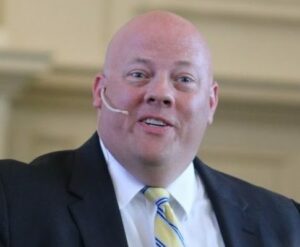A MESSAGE FROM THE REV. J.C. AUSTIN:
THE EDUCATION OF OUR LEADERSHIP
“Great! Now what?”
That’s what a newly-elected Elder said to me a couple of years ago after the Annual Congregational Meeting that year. It can be a bit of a mystery if you haven’t already gone through the process, so I thought I would explain what the folks who were elected Elders, Deacons, and Trustees at the Annual Meeting a few weeks ago have been doing and will be doing before they take up their respective ministries.
First, being Presbyterians, there is an education process. The Reformed tradition,  the theological tradition that traces its roots back to the Protestant cities of modern-day Switzerland (especially Geneva), has always seen education as a crucial element of faith formation in general and leadership development in particular. In terms of ordained leadership, the Reformed leaders felt that the lack of education among priests in that era had caused many of the problems that required the Reformation to fix, particularly the lack of Biblical knowledge and the rise of superstitions around the sacraments, especially Communion.
the theological tradition that traces its roots back to the Protestant cities of modern-day Switzerland (especially Geneva), has always seen education as a crucial element of faith formation in general and leadership development in particular. In terms of ordained leadership, the Reformed leaders felt that the lack of education among priests in that era had caused many of the problems that required the Reformation to fix, particularly the lack of Biblical knowledge and the rise of superstitions around the sacraments, especially Communion.
As a result, they felt that education was crucial to the well-being of both the church and society. This is why Presbyterians in the United States have been so associated with public education, establishing high-quality colleges and universities, and so on. Therefore, they stressed the importance of education for anyone called to ordained leadership in the church.
Today, we continue to follow that commitment. For Ministers of Word and Sacrament like myself and Pastor Lindsey, that means graduating from an accredited institution of theological education that teaches us what we need to fulfill our responsibilities to preach the Word and administer the sacraments faithfully and well.
Elders are called to a different role: to come together through the Session, the governing council of a local Presbyterian congregation, and either make almost all of the decisions in the life of the church or delegate certain responsibilities to other groups and then supervise their work. Deacons are called to another crucial role: a ministry of compassion and justice in the congregation, which involves visiting those who are sick or unable to leave their homes easily, caring for those who are experiencing poverty or other injustices, and so on.
And while Trustees are not ordained, they play a vital role in overseeing the stewardship of our congregation’s major resources like our church facilities and our endowments and other invested funds. All of these roles have particular training that they pick up once they are office, but all of them require a common foundation in the theological commitments and values of our tradition and the practices and processes by which the church is governed. That is the education that our recently-elected officers have been undergoing this month.
Following their education, the Constitution of the Presbyterian Church (USA) requires the current Session to “examine” the officers-elect on their faith and knowledge before deciding whether to approve them for ordination. That language can sound a bit intimidating, but it always ends up being a real highlight of the year for everyone involved because it is an opportunity to talk deeply about some of our most important commitments and most meaningful experiences in our own faith journeys and our life together as a congregation.
That will happen at the end of this month. Once the Session has approved the candidates for ordination, we hold a service of ordination and installation during the worship services on a Sunday in March. But we will talk more about that when the time comes!
In the meantime, please keep the officers-elect in your prayers as they prepare to take up the ministries you have called them to undertake, and please offer some prayers of thanksgiving to those leaders who are completing their terms of active service in March.
Grace and Peace,
J.C.
